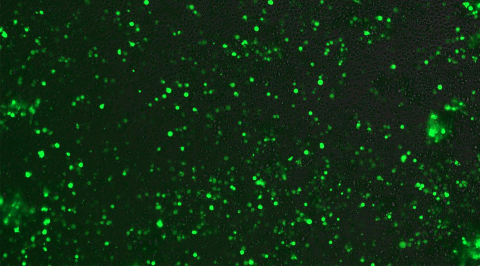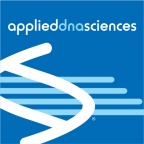Novel DNA Manufacturing Platform Seeks to Pioneer New Generation of Faster, More Affordable Cell-based Therapeutics for Patients
This press release features multimedia. View the full release here: https://www.businesswire.com/news/home/20190408005220/en/

Expression of PCR-generated Green Fluorescent Protein (GFP) gene fragment in hundreds of human T cells. Image: Applied DNA Sciences
LineaRx’s unique PCR-based manufacturing technology created the linear DNA amplicon encoding the anti-CD19 engager, and that construct was then electroporated into human T cells ex vivo. Subsequent testing has yielded anti-CD19 expression from these engineered cells. While these preliminary data are encouraging, overall levels of expression were initially low and LineaRx continues working on generating higher transfection levels using the patent-pending High Expression Amplicon (HEA™) and methods of transfection other than electroporation and will report further progress on this significant achievement as it emerges.
Dr. James A. Hayward, president and CEO of Applied DNA, stated: “Our goals are three-fold: 1) To establish the value of PCR-produced linear DNA as a platform for the rapid design and production of therapeutic nucleic acid constructs, including at the point of care; 2) To prove the improved safety and therapeutic value of NVPF production streams, which are distinct from industry-wide viral-based production; and, 3) To bring our NVPF-based anti-CD19 CAR T cell therapy to the clinic with a future partner.
This accomplishment builds upon another first instance of engineering human T cells via a linear DNA amplicon produced, designed and manufactured via LineaRx’s PCR technology in late 2018. The first instance demonstrated a linear DNA amplicon that contained the complete gene that encoded production of Green Fluorescent Protein (GFP). As seen in the microscope image above, the uptake and subsequent expression of the PCR-generated GFP gene fragment in hundreds of human T cells, facilitated by high-throughput electroporation, created a “constellation” of green fluorescent cells.
In October 2018, LineaRx announced the signing of an exclusive North American licensing and research services agreement with iCell Gene Therapeutics for an anti-CD19 CAR T therapy. Leveraging Applied DNA’s expertise in large-scale PCR-based production and chemical modification of DNA, LineaRx will utilize its NVPF platform to develop and produce expression vectors for CAR T therapies, including for LinCART19™, its non-viral, plasmid-free anti-CD19 CAR T drug candidate.
As discussed at the LinearRx Analyst Day in December 2018, the CAR-T gene construct upon which LinCART19 is based, led to 3 of 3 complete remissions in patients with acute lymphocytic leukemia (ALL) at 6 months after a single low-dose treatment in a clinical trial conducted in China under local regulations. While these promising clinical results provide evidence in the value of the genetic code utilized, the CAR T cells were transfected via viral vector. LinCART19 will utilize linear DNA transfected by either electroporation, soluporation, or other mode of delivery into T Cells.
Without the use of viral vectors or plasmids, LineaRx’s NVPF manufacturing platform holds numerous potential advantages over existing viral/plasmid-based CAR T approaches offering the possibility of more efficient, affordable and safer gene therapies for patients.
Forward-Looking Statements
The statements made by Applied DNA in this press release may be “forward-looking” in nature within the meaning of the Private Securities Litigation Act of 1995. Forward-looking statements describe Applied DNA’s future plans, projections, strategies and expectations, and are based on assumptions and involve a number of risks and uncertainties, many of which are beyond the control of Applied DNA. Actual results could differ materially from those projected due to its history of net losses, limited financial resources, limited market acceptance , the uncertainties inherent in research and development, future clinical data and analysis, including whether any of Applied DNA’s product candidates will advance further in the preclinical research or clinical trial process, including receiving clearance from the U.S. Food and Drug Administration or equivalent foreign regulatory agencies to conduct clinical trials and whether and when, if at all, they will receive final approval from the U.S. FDA or equivalent foreign regulatory agencies, and various other factors detailed from time to time in Applied DNA’s SEC reports and filings, including our Annual Report on Form 10-K filed on December 18, 2018 and our subsequent quarterly report on Form 10-Q filed on February 7, 2019, and other reports we file with the SEC, which are available at www.sec.gov. Applied DNA undertakes no obligation to update publicly any forward-looking statements to reflect new information, events or circumstances after the date hereof to reflect the occurrence of unanticipated events, unless otherwise required by law.
About Applied DNA Sciences
Applied DNA is a provider of molecular technologies that enable supply chain security, anti-counterfeiting and anti-theft technology, product genotyping and pre-clinical nucleic acid-based therapeutic drug candidates.
Applied DNA makes life real and safe by providing innovative, molecular-based technology solutions and services that can help protect products, brands, entire supply chains, and intellectual property of companies, governments and consumers from theft, counterfeiting, fraud and diversion.
Visit adnas.com for more information. Follow us on Twitter and LinkedIn. Join our mailing list.
Common stock listed on NASDAQ under the symbol APDN, and warrants are listed under the symbol APDNW.
About LineaRx
LineaRx seeks to commercialize the biotherapeutic value of Applied DNA’s deep expertise and experience in the design, manufacture and chemical modification of DNA by large scale polymerase chain reaction (“PCR”). Linear DNA is a form of DNA distinct from the circular form of DNA most commonly produced in plasmids and grown in bacteria. Plasmids are extrachromosomal DNA found in bacteria and are associated with the genes for antibiotic resistance which are often exchanged between bacteria and consequentially, are seen by many to embody a serious threat to global health. In addition, many nucleic acid-based therapies also rely on viral vectors for efficient transfection and expression of plasmid DNA. These viral vectors carry additional nontrivial risks and are extremely time consuming and expensive to manufacture.
View source version on businesswire.com: https://www.businesswire.com/news/home/20190408005220/en/
Contacts
program contact:
Brian Viscount
631-240-8877
brian.viscount@adnas.com
investor contact:
Sanjay M. Hurry
LHA Investor Relations
212-838-3777
shurry@lhai.com
web: www.adnas.com, www.linearxdna.com
twitter: @APDN, @LineaRxDNA
Source: Applied DNA Sciences, Inc.







